Vol. 24 No. 37 - July 20, 2020
Features
Town Hall Sparks Action
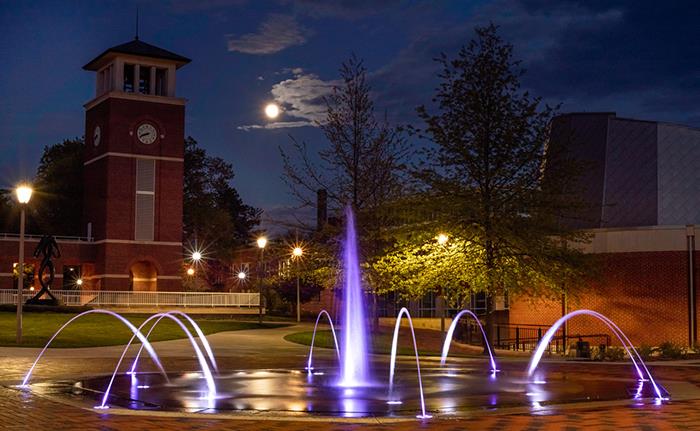
To examine structural and systemic racism, Truman recently conducted a town hall on racial injustice and inequity to provide an opportunity to gain a shared understanding of what must be done to accomplish institutional change. When asked what Truman should do immediately, members of the panel advocated for the importance of making a public statement.
In the wake of the murder of George Floyd, an email was sent to all students, faculty and staff challenging the University to confront the racial injustice and inequity legacies of the past, acknowledge the realities of the present and do real work to achieve an equitable future. It was a call to action in line with rapper and activist Killer Mike’s call to “fortify your own house so that you may be a house of refuge in times of organization.” It is clear that part of fortifying our own house is a collective public statement that was informed by the insights from the town hall:At Truman, we embrace the power of community, value the diversity of perspectives, and espouse the importance of facing challenges and being uncomfortable as a part of growth. Racism, in all forms, is antithetical to community. With inequities, there are divisions, and these divisions prevent us from being the just, inclusive, equitable and true community we want and need to be.
We acknowledge the fear, pain, prejudice, antagonism and subjugation that is ubiquitous in the Black experience and the historical legacy of segregation, marginalization and inequitable access to economic opportunity, social mobility and political power in all higher education institutions, including Truman.
The best way to condemn racism is to be anti-racist. We will actively and consciously work against the multidimensional aspects of racism. We will challenge the notion that racism is only conscious, deliberate and explicit and shift our understanding to address unconscious, unintentional and veiled racist actions.
It is our responsibility to uncover and disrupt systems that perpetuate injustice and inequity, and in doing so, reform all aspects of those systems that are anathema to the principles of racial equity including policies, pedagogy and practices.
Real change will require collective, concerted, unrelenting efforts over an extended period of time. Our progress in achieving a just, inclusive, equitable, and true community will require personal and institutional self-reflection, humility, honesty and fully embracing the universal intrinsic worth of all human beings.As important as these words are, words without action are performative allyship that do little to address the true matter at hand. As a liberal arts and sciences institution, it is in Truman’s core to be a force for change in the world. To that end, the University is focusing on six core areas: access and recruitment; student success, retention and integration; recruitment, hiring and development of employees; campus culture; curricular and co-curricular learning; and alumni community. The University has begun taking the first of many steps to make impactful and sustained progress in these six areas:
• With the hiring of a diversity and inclusion consultant with a powerful connection to Truman, the University takes a significant step forward in developing impactful short-term strategies and long-term goals to bring about greater diversity, inclusion and equity.
• Organizations like the Association of Black Collegians continue to advocate passionately for racial equity and justice. Recently, President Thomas had a very enlightening and productive conversation with the group about their experiences and the essential changes the University must make. Their continued partnership will ensure Truman maintains vigilance in inclusion and equity efforts and creating sustainable institutional change.
• Truman’s Center for Diversity and Inclusion recently hosted a virtual presentation on the foundations of social justice, with a special emphasis on racial justice. Participants found it to be a useful exercise in self-examination and systemic analysis.
• The Minority Ambassadors Program has moved under the direction of the Office of Admission and will be enhanced to more successfully meet its mission of recruiting minoritized students and hosting events that promote cultural awareness.• The New Truman Student Experience will have an increased attention to diversity and inclusion across its three elements: Truman Week (activities scheduled before and during the beginning of classes), the Truman Symposium (a common speaker/activity series for new students), and the Self and Society Seminar (a small-group class required for all new students).- Truman Week already includes multiple programs related to diversity and inclusion; they will be strengthened and improved this year. The Truman Symposium will focus one of its four modules on “Advancing Inclusion and Equity.” Students will have small group discussions about this module in their Self and Society Seminar. The Self and Society Seminar will also include an anti-racist reading list, and will have minimum standards for Intercultural Thinking, consistent with national standards.
• Faculty Governance is examining improvements to the Intercultural Perspective of the curriculum to make it more specifically connected to issues of race, class, and gender. It is also working with the Academic Professional Development Center to provide training for all faculty on issues such as how to handle difficult discussions, how to recognize conscious and unconscious biases, and how to be an anti-racist in the classroom.
• A group of University members will be tasked in the next few weeks to develop a comprehensive strategic plan for diversity and inclusion that includes metrics, measures, and initiatives that address the six core areas and builds upon the current Strategic Plan for Inclusive Excellence. This modified and updated strategic plan will provide measurable, accountable actions that will serve as a blueprint for how the University can maintain continuous progress. The plan will be completed by the end of the calendar year.
These are the most recent actions in what is an ongoing effort to address injustice and inclusion. In the spirit of transparency and accountability, all University messaging and actions related to confronting racial injustice and inequity and advancing inclusion will be posted on the Center for Diversity and Inclusion website. Check back often to review additional actions or to offer ideas.Virtual Summer Program Engages Local Children, Gives MAE Students Experience
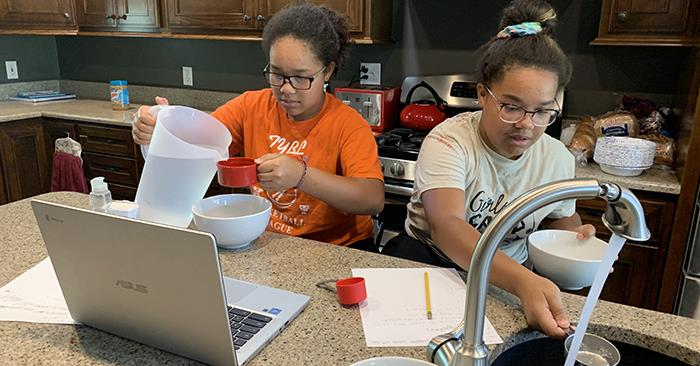 Makayla (left) and Mackenzie Smith work on a science experiment during the Virtual Summer Enrichment Program. Truman partnered with the Kirksville R-III School District to provide educational opportunities in an alternate format since traditional summer school courses were suspended due to the coronavirus. Thirty-one MAE students were also able to gain teaching experience through the program.In the spring, as the coronavirus was disrupting K-12 education in ways never before imagined, a small group from Truman and the Kirksville School District were already working to solve a problem few had begun to consider: what about summer school?
Makayla (left) and Mackenzie Smith work on a science experiment during the Virtual Summer Enrichment Program. Truman partnered with the Kirksville R-III School District to provide educational opportunities in an alternate format since traditional summer school courses were suspended due to the coronavirus. Thirty-one MAE students were also able to gain teaching experience through the program.In the spring, as the coronavirus was disrupting K-12 education in ways never before imagined, a small group from Truman and the Kirksville School District were already working to solve a problem few had begun to consider: what about summer school?
For a variety of reasons, summer school has grown increasingly more important. The Kirksville School District typically offers a full-day program for 24 days that provides students with an extensive, engaging curriculum and offers incentives to attend. It also doubles as a valuable exercise for Truman Master of Arts in Education students to work side by side with professional teachers.
“This has always provided a great learning opportunity for our students and teachers, as well as the Truman students,” said Tricia Reger, assistant superintendent for the Kirksville School District. “We held out hope that our summer program could go on as planned, until mid-May when it became obvious that was not going to happen.”
District administrators, along with representatives from Truman’s Education Department, devised a solution that involved equal parts cutting-edge technology and a centuries-old approach to education.
“As we were talking, we brainstormed hosting a virtual one-room schoolhouse so the whole family could join,” said Wendy Miner, department chair and professor of education. “We were not sure how many families would be interested. We had more interest than we expected, so we opened it up to more families.”
Quickly born out of necessity, the Virtual Summer Enrichment Program offered area K-8 students, along with their family members, an hour of themed learning every day for a week. The 31 participating MAE students were divided into teams, and each team was responsible for two families per week for three weeks.
Kneka Smith enrolled her daughters Makayla and Mackenzie to keep their minds engaged during a summer void of their normal activities. Although they signed up for one week, the girls begged to do a second.
“The teachers took them on a learning journey that included leading math, science and writing lessons. They demonstrated excellent active learning techniques for online instruction and the girls engaged,” Smith said. “The girls were reminded that learning should be fun and it can happen remotely.”
For the MAE students, although they were spending two hours a day working directly with students and families, a considerable amount of work went into pulling the Virtual Summer Enrichment Program together. For one thing, they had to be prepared to teach a wide range of ages since children participated as families, not pre-sorted classrooms. The MAE students had their own class in the morning, as well as a one-hour seminar after each daily session. Like a traditional summer, they were observed by Education Department faculty, and this year MAE alumni were also contacted to serve as mentors to the aspiring teachers.
“This experience taught me a lot about flexibility, individualization and building relationships,” said Courtney Atwell, a Truman MAE student. “Having this experience with a short-notice change has given me the opportunity to be innovative and exercise a different side of educating than I would get in a classroom field experience.”
Going into the Virtual Summer Enrichment Program, Atwell had concerns about challenges in communicating with her students and colleagues, as well as with the technological familiarity needed to be successful, not to mention learning a completely new way of teaching with very little time to prepare. What seemed like adversity in the beginning she now views as opportunity.
“I am so grateful for all of these challenges because they have helped me grow professionally and personally,” Atwell said. “Having this experience where various skills are unexpectedly called upon has given me the opportunity to learn more about myself and use that to benefit my educating abilities.”
Fellow MAE student Hayley Brotherton thought it might be difficult to maintain students’ attention while teaching virtually, but that proved not to be an issue.
“We discovered that if students are interested in the content being taught they will stay on the screen,” Brotherton said. “At the end of every week, there was not a single student who wanted the week to end. For students that are spending an hour of their summer day online in summer school, I took that as a huge compliment.”
Parents seemed to be actively engaged too, a side benefit Brotherton noted would not have been available under normal conditions.
“During the week we often received emails from parents sharing how much their student was enjoying the course, and they would even share pictures of their students’ work,” she said.
By all accounts, the Virtual Summer Enrichment Program was a success, especially considering it was created on short notice in a format unfamiliar to most educators and students. Nearly 100 children from 57 families participated in the event.
“It was a win-win,” Miner said. “Students in K-8 had an opportunity for enrichment this summer, parents had an opportunity to learn with their kids if they wanted to do so, and our students practiced teaching.”
The Kirksville School District plans to resume in-person classes in some format in August. With the coronavirus continuing to create uncertainty, exactly what education looks like in the near future is still unclear. An added value of the Virtual Summer Enrichment Program may be the role it has in shaping the future of teaching.
“This, combined with all our teachers learned as they educated virtually this past spring, will all prove to be very valuable feedback as we plan for what is ahead,” Reger said. “I especially found the team teaching concept Truman used during the summer to be a great take away for us at Kirksville R-III. I believe this will provide our teachers more support and options in a virtual learning setting.”Appellate Court Judge to Give Commencement Address
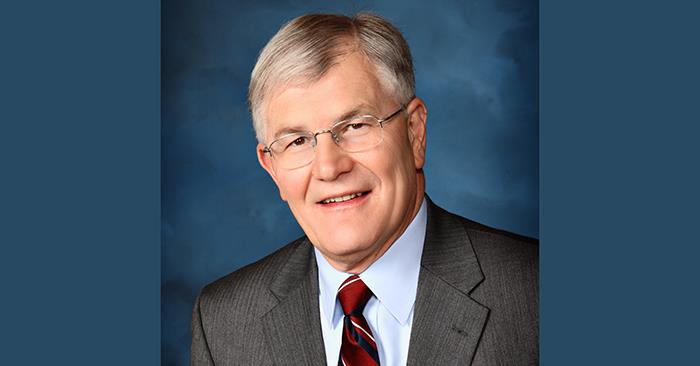
Judge Duane Benton will give the commencement address during Truman’s virtual graduation ceremony at 11 a.m. Aug. 1.
Benton is a judge on the United States Court of Appeals for the Eighth Circuit, which hears appeals from the federal courts in seven Midwestern states and is subject to review only by the U.S. Supreme Court. He has the distinction of being the first and only U.S. circuit judge who is a certified public accountant.
Previously, Benton served on the Missouri Supreme Court from 1991 until 2004. In 1997, the other judges of the court elected him chief justice for a two-year term.
Born in Springfield, Benton grew up in Mountain View and Willow Springs, Missouri. He is a 1972 graduate of Northwestern University, graduating summa cum laude and Phi Beta Kappa. Benton received a law degree from Yale Law School in 1975, distinguishing himself as editor and managing editor of the Yale Law Journal. Selected as a Danforth Fellow, he completed the Senior Executives Program at Harvard University’s John F. Kennedy School of Government.
A Vietnam veteran, Benton retired from the U.S. Naval Reserve at the rank of captain after 30 years of active and reserve service. He is a graduate of the Naval War College and has assumed leadership roles in the American Legion, the Veterans of Foreign Wars and the Missouri Military Advisory Commission.
From 1975 to 1979 Benton served with the U.S. Navy as a judge advocate. While in the Navy, he attended Memphis State University, earning a master’s degree in business administration and accountancy.
In a decorated professional career, Benton excelled as the chief of staff to a Missouri congressman, a private attorney in Jefferson City and the 14th director of revenue in the history of Missouri. Additionally, he taught as an adjunct professor at Westminster College and at the law schools of Vanderbilt, Missouri, Brooklyn, Pepperdine and St. Louis University.
Among his many public service appointments, Benton was chair of the Multistate Tax Commission and president of the Midwestern State Association of Tax Administrators. He served on the board of the Missouri State Employees Retirement System, the Missouri Commission on Intergovernmental Cooperation, the Council for Drug Free Youth and the Jefferson City United Way. An active Rotarian, Benton has been president of two clubs, a district governor and president of Show Me Rotary multidistrict president-elect training.
Benton is a member of the Missouri Bar, the American Institute of Certified Public Accountants, the Missouri Society of Certified Public Accountants and the American Academy of Attorney-CPAs.Alumni Couple Establish Scholarship for PT Students
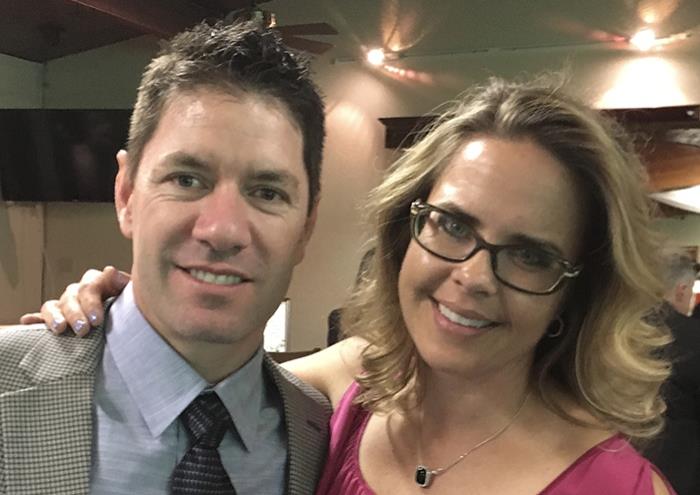 Drew and Katherine (Felke) GiardinaTruman students with an interest in pursuing a career in physical therapy will soon have a new support system thanks to a gift from an alumni couple.
Drew and Katherine (Felke) GiardinaTruman students with an interest in pursuing a career in physical therapy will soon have a new support system thanks to a gift from an alumni couple.
Drew and Katherine (Felke) Giardina recently created the Total Sports Therapy Graduate Studies Scholarship through a $25,000 gift on behalf of Total Sports Therapy.
Drew and Katherine both graduated from Truman in 1998. Drew later went to graduate school to earn his Doctorate in Physical Therapy from A.T. Still University. He opened Total Sports Therapy in Phoenix, Ariz., in 2006 to supply personalized outpatient orthopedic physical therapy in a relaxed and professional environment.
“The professional and academic foundation created at Truman was integral in my success as a graduate student and then later as a professional in the field of physical therapy,” Drew said. “Katherine and I wanted to return the favor to the University, as well as help current students reach their goals.”
The Total Sports Therapy Graduate Studies Scholarship was created to financially assist deserving undergraduate students who are looking to attend graduate studies in physical therapy for the purposes of becoming a licensed physical therapist.
More than 1,000 scholarships are available to students through the Truman State University Foundation. Thanks to the generous support of alumni and friends, the Foundation awards in excess of $1.4 million annually.
For a complete list of scholarships available through the Truman State University Foundation, and details on how to apply, click here.Kirksville Misses Students
In August, students will return to campus for the first time in five months. The coming school year will be different in many ways, with most activities being altered in accordance with best practices to prevent exposure to and spread of the coronavirus. Even with all of the planned adjustments, there is excitement about students returning. Their absence has been noticeable.Office of Admission Opens Applications for Fall 2021
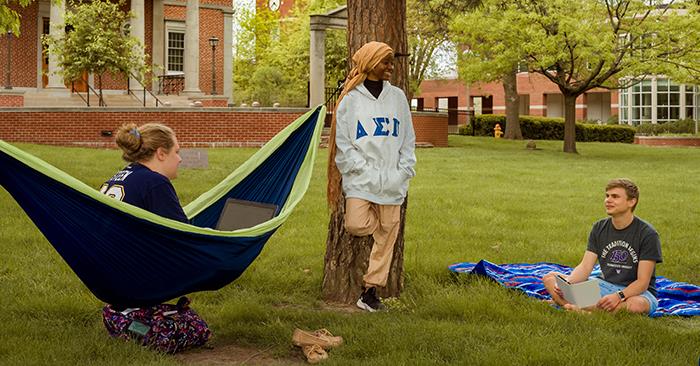
Students who want to enroll at Truman starting in Fall 2021 can now apply online.
Applications are now being accepted for the 2021-22 school year, and prospective students can find everything they need at apply.truman.edu. Those who are ready can apply directly on this page.
Incoming freshmen are encouraged to review the University’s TruMerit Scholarship – determined by a combination of ACT/SAT score and GPA – to see if they are eligible for automatic admission which would then require only an undergraduate application, transcript and verified test score required.
To be considered for competitive scholarships, an activities list and essay are strongly recommended. For students who do not qualify for automatic admission, a holistic review of all application materials will be conducted to gain a more complete understanding of a student’s skills and talents. Truman will offer a test-flexible policy for freshman applicants for Fall 2021, and the specifics can be viewed here.
The Common Application will be available Aug. 1 for students utilizing that option. The Office of Admission will begin the review process in mid-August.
Alumni and friends who would like to refer a prospective student to the University can do so online.
Announcements
Fall Website Adds Academic Information
Students interested in learning more about how their classes for the coming semester will be delivered can visit the Fall 2020: Academics page. Detailed instructions on how to navigate the Open Course List on TruView, as well as how to determine a course’s method of delivery, are easily accessible.
All general information about the upcoming academic year is available at the Fall 2020 website. The page also features quick links to specific subtopics including: FAQ, Health and Wellness, Academics, Campus Life and Resources.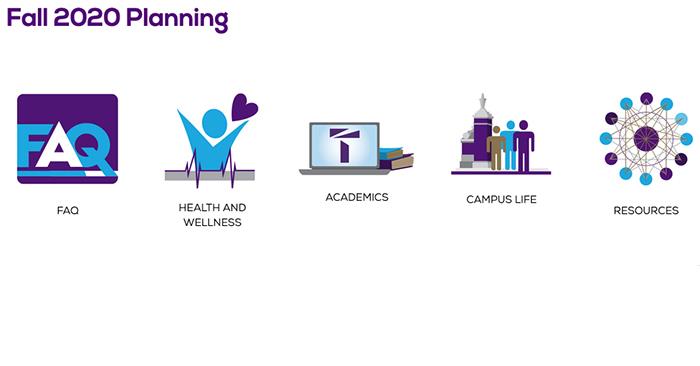
Webinar to Focus on Careers

The next event in the Office of Advancement’s webinar series Bulldog Break will focus on the ever-changing job landscape. This one-hour event will include: the impact COVID-19 and social unrest are having on employment; advice on building and managing meaningful career-focused networks; and things individuals should consider when seeking a career.
12 p.m. (Central Time)
July 23
Register here for this free event. There are only 100 spots available.
Questions about this event can be directed to bulldogforever@truman.edu.
Session Panelists
Phil Hall (’85)
Sr. Vice President - Employee Relations Leader
Wells Fargo
Bernee Long (’81)
Director - Organizational Learning & Talent Development
Society for Human Resource Management
Jenni Nuhn (’09)
Assistant Director,
Truman State University Career Center
David Lusk (Moderator)
Associate Vice President for Career Development
Truman State University
Charles Hunsaker (’98) (Host)
Director of DevelopmentSubmit Photos for Graduation
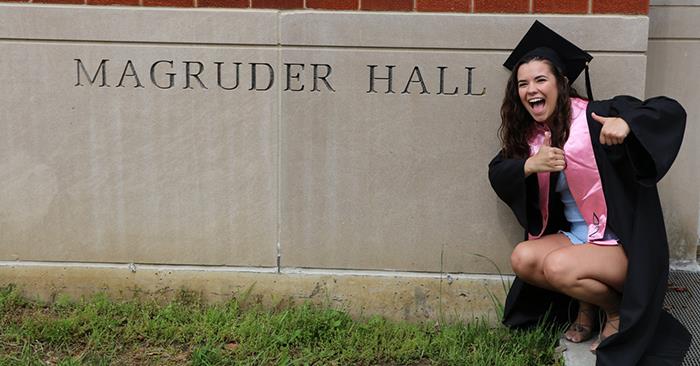
Graduating seniors can make submissions for the commencement ceremony photo montage through July 22. These can include pictures of students in their cap and gown at home, as well as photos of them at a campus location with a special personal significance or from events hosted by their student organizations.Student Loans Available Through University Foundation
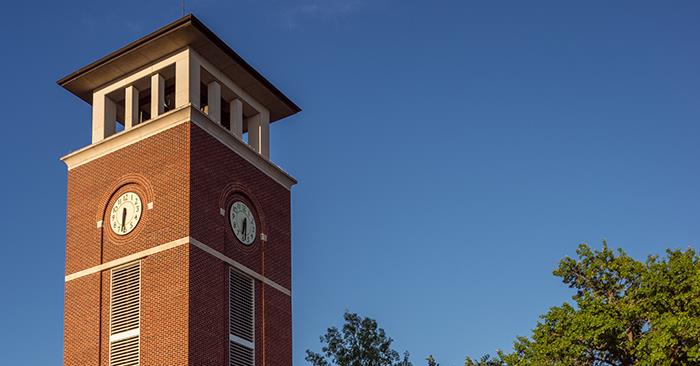
Students with financial needs that may interfere with their ability to continue their education can seek assistance through the Truman State University Foundation Loan Program.
Foundation loans can come in the form of short-term loans, long-term loans, access loans and cultural loans. Applications go through the Financial Aid Office and are repaid directly to the University. Banks and outside lenders are not involved in the process.
To be eligible for a Foundation loan students must be enrolled on a full-time basis and be in good academic standing. Students also need to demonstrate an ability to repay the loan in a timely manner. Deferments of up to five years are available for cultural and long-term loans, provided the student is enrolled on a full-time basis.
In addition to scholarship assistance, the loan program is an example of the immediate impact of donations to the Truman State University Foundation. Gifts from alumni and friends allow Truman to provide assistance directly to students as they pursue their education.
For more information on the Foundation loan program, contact the Financial Aid Office at finaid@truman.edu, at 660.785.4130 or in person at McClain Hall 103.Bookstore Diploma Frame Sale

Board of Governors Meeting
The Board of Governors will meet at 1 p.m. Aug. 1 in the Student Union Building Georgian Room B.Next Issue
The next issue of the Truman Today will be available Aug. 17.
Notables
Notables
Jiba Dahal, assistant professor of physics, and Keshab Dahal, assistant professor of statistics, recently published a peer-review article in the Open Journal of Statistics. In the article, they analyze the crime statistics of San Francisco and its resolution of crime recorded from January to September in 2018. They define resolution of crime as a target variable and study its relationship with other variables.Anton Daughters, associate professor of anthropology, recently edited “Moquis and Kastiilam Hopis, Spaniards, and the Trauma of History, Volume II, 1680–1781” through the University of Arizona Press. It continues the story of the encounter between the Hopis, who the Spaniards called Moquis, and the Spaniards, who the Hopis called Kastiilam, from the Pueblo Revolt in 1680 through the Spanish expeditions in search of a land route to Alta California until about 1781.Brian Ott, assistant professor of sociology, has published “Minimum-wage Connoisseurship and Everyday Boundary Maintenance: Brewing Inequality in Third Wave Coffee” in the journal Humanity & Society. Relying on data collected from more than a year of ethnographic fieldwork, Ott argues the specialty coffee industry represents a qualitative shift in the coffee industry, one that produces a new niche market and consumer base that commoditizes sensory experiences as embodied class dispositions.Truman was recently recognized as the best public college in Missouri for getting a job after graduation by Zippia.com. The career resource website rated Truman at No. 7 overall on its list.
Scholarship Opportunities
Nationally Competitive Scholarships and Fellowships
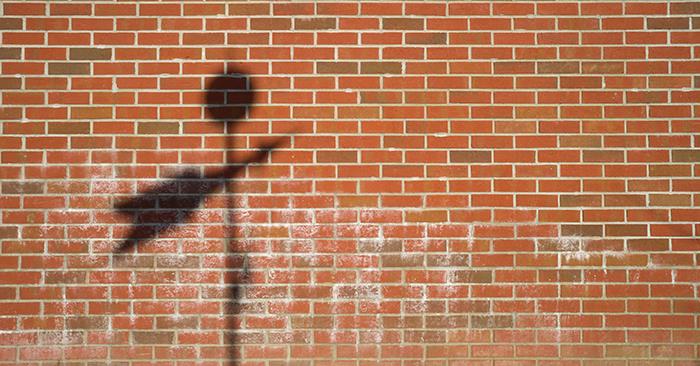
Each year Truman nominates students for national fellowship opportunities who have shown outstanding academic performance and exceptional service accomplishments. The application process is very rigorous and highly competitive, but the University provides support as students prepare for and then apply to these prestigious scholarships. Listed below are several of the major national fellowships and their websites. More information about these fellowships is available at www.truman.edu/majors-programs/more-learning-opportunities/fellowships.
For Graduate Studies
Fulbright Grants
Research grants and teaching assistantships for a year abroad
Rhodes Scholarships
Grants for two years of study at Oxford University
Marshall Scholarships
Awards for two years of study in any British university
Mitchell Scholarships
One year of graduate study or research in Ireland or Northern Ireland
Gates Cambridge Scholarships
Awards for an advanced degree or second bachelor’s degree at the University of Cambridge
For Undergraduate Studies
Goldwater Scholarships
Up to $7,500 annually for tuition, fees, books, room and board for science and mathematics majors
Harry S. Truman Scholarships
For senior year and post-graduate study leading to a career in public service
Udall Scholarships
For students interested in careers related to environmental issues or for Native Americans and Alaskans interested in careers related to health care and tribal public policy
Carnegie Endowment Junior Fellowships
For students interested in international affairs to work as research assistants to the Endowment’s senior associates in Washington, D.C. for a full year
Boren Scholarships
To study abroad in areas of the world that are critical to U.S. interests